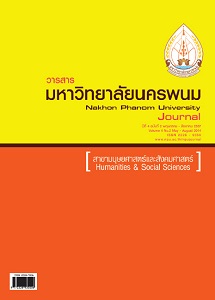การเปรียบเทียบความสามารถด้านสติปัญญาและความเชื่อมั่นในตนเอง ของเด็กปฐมวัยชั้นอนุบาลปีที่ 2 ระหว่างการจัดประสบการณ์ แบบโครงการกับการจัดประสบการณ์แบบสตอรี่ไลน์
Main Article Content
Abstract
การวิจัยครั้งนี้มีวัตถุประสงค์เพื่อ 1) เปรียบเทียบความสามารถด้านสติปัญญาและความเชื่อมั่นในตนเองของเด็กปฐมวัย ระหว่าง การจัดประสบการณ์แบบโครงการกับแบบสตอรี่ไลน์ 2) ศึกษาความพึงพอใจของเด็กปฐมวัยที่ได้รับการจัดประสบการณ์แบบโครงการ กับแบบสตอรี่ไลน์ กลุ่มตัวอย่างที่ใช้ในการวิจัย ได้แก่ เด็กปฐมวัยชั้นปีที่ 2 ภาคเรียนที่ 1 ปีการศึกษา 2555 โรงเรียนบ้านเสาเล้า สำนักงานเขตพื้นที่การศึกษาประถมศึกษานครพนม เขต 2 จำนวน 47 คน จาก 2 ห้อง เป็นกลุ่มทดลองที่ 1 จำนวน 24 คน จัดประสบการณ์แบบโครงการ และกลุ่มทดลองที่ 2 จำนวน 23 คน จัดประสบการณ์แบบสตอรี่ไลน์ ซึ่งได้มาโดยการเลือกแบบเจาะจง แล้วสุ่มแบบกลุ่มเพื่อเลือกห้องสำหรับการทดลอง เครื่องมือที่ใช้ในการวิจัย ได้แก่ แบบทดสอบความสามารถด้านสติปัญญา ชนิด 3 ตัวเลือก จำนวน 15 ข้อ มีค่าความยากระหว่าง 0.44 ถึง 0.68 มีค่าอำนาจจำแนกระหว่าง 0.40 ถึง 0.73 และมีค่าความเชื่อมั่นทั้งฉบับเท่ากับ 0.75 แบบสอบถามความเชื่อมั่นในตนเอง ชนิด 3 ตัวเลือก จำนวน 10 ข้อ มีค่าอำนาจจำแนกระหว่าง 0.31 ถึง 0.65 มีค่าความเชื่อมั่น ทั้งฉบับเท่ากับ 0.83 และแบบสอบถามความพึงพอใจของเด็กปฐมวัยที่มีต่อการจัดประสบการณ์ทั้ง 2 วิธี เป็นแบบมาตราส่วนประมาณ ค่า 3 ระดับ วิธีละ 12 ข้อ มีค่าอำนาจจำแนกระหว่าง 0.25 ถึง 0.80 และ 0.28 ถึง 0.79 มีค่าความเชื่อมั่นทั้งฉบับเท่ากับ 0.87 และ 0.86 ตามลำดับ สถิติที่ใช้ในการวิเคราะห์ข้อมูล ได้แก่ ค่าเฉลี่ย ร้อยละ ส่วนเบี่ยงเบนมาตรฐาน และทดสอบสมมุติฐาน โดยใช้ t-test (Independent Samples) ผลการวิจัยพบว่า 1) เด็กปฐมวัยที่ได้รับการจัดประสบการณ์แบบโครงการ มีความสามารถด้านสติปัญญา และความเชื่อมั่นในตนเอง สูงกว่ากลุ่มที่ได้รับการจัดประสบการณ์แบบสตอรี่ไลน์ อย่างมีนัยสำคัญทางสถิติที่ระดับ .05 2) เด็กปฐมวัยที่ ได้รับการจัดประสบการณ์แบบโครงการกับแบบสตอรี่ไลน์ ต่างมีความพึงพอใจอยู่ในระดับมากทั้ง 2 วิธี
The purposes of this study were: 1) to compare intelligent ability and self-confidence among the children through the organization of the experience by project learning and story line learning, and 2) to examine children’s satisfaction with the organization of the experience by project learning and story line learning. The sample used in this study was a total of 47 second-year-kindergarten children enrolled in the first semester of academic year 2012 at Ban-Saolao School under the Office of Nakhon Phanom Primary Education Service Area 2. The sample was selected by purposive sampling and then assigned to each of two classes for the two experiments. The treatment group 1 of 24 children was organized with the experience by project learning, while the treatment group 2 of 23 children was organized by story line learning. The instruments used in this study were a 3-alternative test of intelligent ability with 15 items whose difficulty values ranged between 0.44 and 0.68, discrimination power values between 0.40 and 0.73, and entire reliability was 0.75; a 3-alternative self-confidence questionnaire with 10 items whose discrimination power values ranged between 0.31 and 0.65 and entire reliability value was 0.83; and 3-rating scale questionnaire with 12 items asking children’s satisfaction with the organization of the experience by both of the methods, whose discrimination power values ranged between 0.25 and 0.80 and between 0.28 and 0.79, and entire reliability values were 0.87 and 0.86 respectively. Statistics used to analyze data were mean, percentage, standard deviation and t-test of independent samples for hypothesis testing. The results of study disclosed as follows: 1) The children who got a treatment of the experience by project learning had a significantly higher intelligent ability and self-confidence than those who got a treatment of the experience by story line learning at the .05 level; 2) the children who got a treatment of the experience by both of the teaching methods – project learning and learning by story line were satisfied with it at high level.


